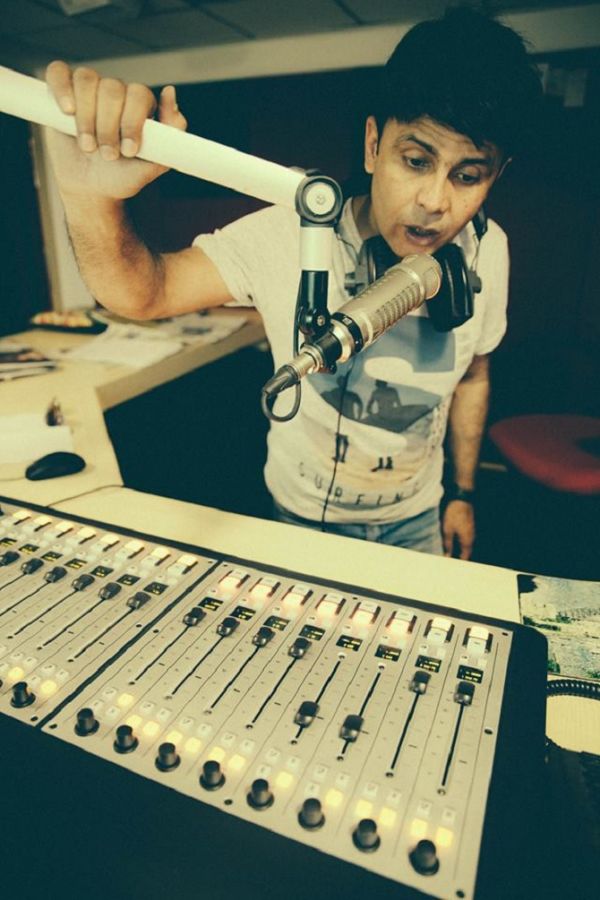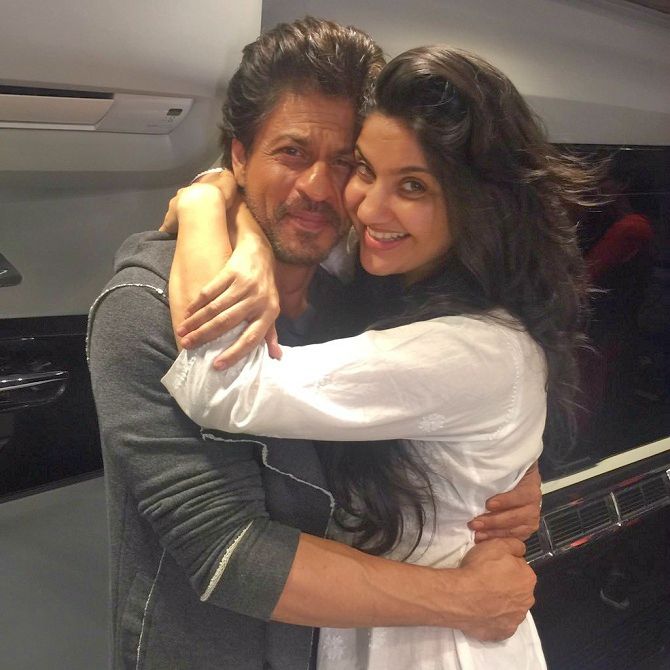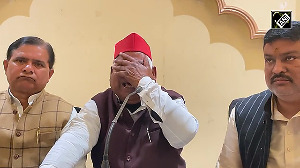Radio jockeys are the new celebrities.
With the release of the Vidya Balan-starrer Tumhari Sulu, we revisit Manavi Kapur and Nikita Puri's account of the expanding role of RJs.

Photograph: @mymalishka/Twitter.
It was a perfectly mundane July evening in 2016 that soon became a nightmare for many in Gurugram. A monsoon downpour brought the city to a grinding halt, leaving people stuck in their cars for up to six hours. As horns blared around them, drivers and occupants had only one loyal companion -- the good old radio.
"When tempers are flying, your favourite song on the radio can do a lot to calm you down," says Priyanka Chawla, a start-up employee who works in Gurugram.
That night, radio jockeys -- the stars of the airwaves -- shared their own stories of how they reached their workplaces or homes to connect with their listeners at an immediately personal level. For their listeners, it meant they were not alone.
Radio, today, is the hyper-local medium that has gone beyond its role of reading the news or playing popular music. RJs have to be on their toes, talking about issues varying from traffic jams and floods to farmer suicides, to keep their listeners enraptured. Not a minute can be wasted on a subject that will not interest the particular RJ's immediate audience.
"When I started off as a jockey, each song would be preceded by what was called a 'radio link' -- almost a minute was spent narrating the title of the song, the album, its singers, lyricist and composer," says Naved Khan, an RJ who runs the popular prank segment Murga on Radio Mirchi.
Those days, as is evident from the younger, more dynamic content, are long gone. And with that has come the need for the RJs to stay connected, 24x7, and to have their fingers firmly planted on the nation's pulse.
"People think our job is easy, and ends with those four hours in the studio," says Ginnie Mahajan, who hosts Radio City's morning show, Suno Na Dilli, in New Delhi. "The fact is we can never truly switch off. Everywhere I go, including when I'm buying vegetables, I'm looking for experiences that could be relevant to my listeners."
Most RJs say that reading six to eight newspapers every day is a given. Opinions have to be shared and accepted with care, which can only happen when the RJ is well informed.
"Even if you look at Babbar Sher [the satirical qawwali on Radio City], you'll notice how the satire is contextual to an immediate occurrence," says Archana Pania, an RJ with Radio City, Mumbai, who hosts the morning show Kasa Kai, Mumbai.

Photograph: @RJNaved/Facebook.
While radio channels in India cannot broadcast news, programming has become bolder when it comes to sharing opinion on current affairs and politics. RJs like Ginnie often take civic administrators and MLAs to task over incomplete flyovers, persistent traffic jams, potholes and waterlogging, among a plethora of other issues.
"Just like journalists, we also have to spend the rest of our day chasing interviews and making sure the content is within protocol," says Ginnie.
It isn't as if the conversation doesn't get heated at times, she adds: "But it sometimes works in my favour. When the politician or administrator is not radio-savvy, I tend to get more honest answers, which, in turn, helps me keep a listener engaged for that much longer."
On a particular day in the studio, Disha Oberoi, the morning show RJ for 93.5 RED FM, receives a call from a listener who thought of calling her instead of the police when he found ₹10,000 left in the ATM for ways to find the rightful owner. As Oberoi airs the call, suggestions pour in via phone, and also through the tab that is specifically meant for the purpose.
Somewhere between the dance number Kala Chashma and a track from Meri Pyari Bindu comes in another call. This time, the caller tells Disha that the alcohol ban along highways, which hit Bengaluru on July 1, shouldn't just be restricted to certain roads; it should be extended to the entire city.
"It's very healthy to have callers with differences in opinions. As long as there's nothing that's politically motivated, or about religion, I put it up," says Disha.
From garbage segregation to the city's dying lakes and public transport, there's little that Disha's show leaves out.
While most RJs say their stint with the radio happened by chance, some know they were born for it. "When I was living in the Gulf, the radio was my only connect to India. Besides, when you called the station with a song request, that fleeting moment of celebrity used to be thrilling," says Archana.
Naved, whose father teaches at the Jamia Millia Islamia University, came from a financially troubled family set-up, and started working odd jobs right after school. "My first job was as a handy man hanging curtain rods in people's homes."
Before turning to radio, Naved was a customer service executive with a leading mobile operator. "When they realised I could imitate voices, they would make me pose as a woman on the night shift, or as a Sikh man speaking to his caller from Punjab."
But radio, which he joined in 2004, has been the single most exciting job of his life. "There hasn't been a day in the last 13 years that I have not enjoyed."
Today, like Naved, Archana enjoys a celebrity status of her own. "A cab driver once recognised my voice and was so excited to be talking to me," she recalls.
Another time, someone pointed out that her photographs were being used by someone on their social media account as their own. "It is both empowering and gratifying to realise that radio has the potential to reach everyone -- from a cab driver and sabzi waala to the prime minister of the country," says Archana.
Like Archana, Ginnie has had random strangers recognise her voice and ask her if she was the same person they just heard on the radio. Some even recite the jingle of the show to make that connection. "But it is also a little sad, because there was a charm to being faceless," says Ginnie.
That is gone now because of their presence on social media, an imperative to survive in the 360-degree media experience.
Many RJs, owing to this stardom, also have their quirks and demands. Some want their coffee a particular way, others are hard to negotiate content with.
Naved says he has no such totems. "Some people say you shouldn't have rice or anything sour before a show. I eat everything."
The voice resting technique is also popular, but it can be hard for RJs who love to talk. "Why do you think I love my job so much? I love talking!" gushes Archana.

Photograph: @Archanaapania/Twitter.
In a studio in Bengaluru, from where Disha hosts the morning show, senior programming head Manu Tripathi has seen his fair share of pre-show rituals many subscribe to before going on air. There was the RJ who needed to meditate before going live, and another who'd play video games. Tripathi has also held up placards and teddy bears to ensure a host is happy.
Disha, he says, has no such demands. She dives straight in at 7 am every day without fail, and continues taking calls and shuffling through a playlist of the latest Bollywood hits for the next four hours.
In the space where her channel's logo dominates the walls in red and white, Disha stays glued to her chair. A large editing console, three monitors, a phone line, a tab and a water bottle are her sole companions there, save the times she has a guest. Powered by seemingly boundless supplies of energy, the former air hostess is the person a cabbie recommends you tune in to when you are new to the city: she'll tell you about how the city ticks, you're told.
For their cities, Archana and Ginnie represent the same space.
"If you look from the outside, I will come across as some mad person talking animatedly into the microphone," laughs Archana.
This is where a show's producer plays a vital role. What a director is to a film, a producer is to his show and the RJ. "When a show is not getting the kind of listener engagement, my producer will help me change strategy. That quick thinking is required when you need to pivot," says Ginnie.
"Plus, it can get quite manic sitting alone for four hours. It helps to have a voice to steer you to think clearly and keep you calm," she says.
In Naved's case, his team is essential to the kind of prank calls he makes, especially to save the channel from any litigation and to soothe tempers when a prank begins going south. "That is why before airing any prank, we take consent from the person on the call. There are lines that I know I cannot cross and my producers help me stay true to those guidelines," says Naved.
In the South, Danish Sait from Fever 104 FM is the star prankster. Sometimes he's Asgar, who calls to tell you how sincerely he's cleaned your aquarium, how he first laid the fish out on the table, cleaned and filled the tank with chlorine, then placed your expensive fish back, carefully. Or he's the extremely corrupt Nograj, who once terrorised a youngster by pretending to be his girlfriend's father.
In his cabinet of personas, there are about six other characters, which he has been developing for almost eight years, ever since his cousin told a studio executive that he "had a face for radio".
Realising the traction Nograj got on the Web , the character now has a movie to its name. Called Humble Politican Nograj, the English-Kannada film is 'caming soon' as the posters claim (September). Several RJs have also joined television and news channels to host shows across genres.
But humour, as many professionals will reaffirm, can get serious very quickly.
Like the time Danish pranked a mother by saying her son hadn't done well in his exams. Feeling the call may have been a bad idea, Danish took the recording to Darius Sunawala, one of the city's most beloved RJs and the programming director for Fever 104 FM. "Do you realise there's such a tremble and concern in the mother's voice?" Sunawala asked, straightway dropping the idea of running it.
In another case, a caller wanted Danish to find out if her husband was having an affair.
"People like masala, and I realised at some point I was being an absolute sell-out to the people who listen in. But my boss [Harsha Shivaram] reminded me how this prank could potentially be damaging someone's home," says Danish. "The implication of that on a family was a lot bigger than a hundred people laughing at the joke."
Because of the wide spectrum radio caters to, "the responsibility is a lot more. I can't say I'm just going to do prank calls and get away with it," he says.
"It is a challenge to upset one man or woman to make so many others happy. I often receive threats on email and social media," says Naved. "More often than not, I try to reason with the people writing in. Because beyond the humour, there is also an important social message that these pranks are trying to send out." For instance, he has called out stalkers in neighbourhoods and those who think women are meant to remain indoors.
But what works most for radio, according to these popular RJs, is the fact that the medium is still largely uncorrupted.
"Radio is a medium that never leaves you. It might sound clichéd, but I believe it is the cupid that helps you be in touch with your own heart," says Archana.












 © 2025
© 2025